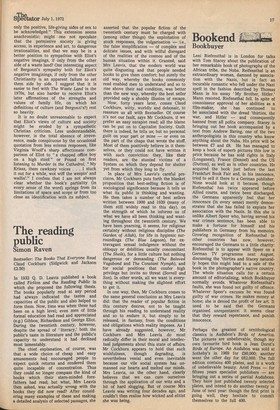The reading public
Simon Raven
Bestseller: The Books That Everyone Read Claud Cockburn (Sidgwick and Jackson £2.50) In 1932 Q. D. Leavis published a book called Fiction and the Reading Public in which she proposed the following thesis. The books popularly read at any period had always indicated the tastes and capacities of the public and also helped to form them. Now, time was when these had been on a high level; even men of little formal education had read and appreciated (e.g.) Gibbon, Richardson and George Eliot. During the twentieth century, however, despite the spread of 'literacy,' both the public's taste in literature and the public's capacity to understand it had declined most lamentably. The chief explanation, of course, was that a wide choice of cheap and easy amusements had encouraged people to expect quick returns and rendered them quite incapable of concentration. Thus they could no longer compass the kind of books which their stern-minded forefathers had read; but what, Mrs Leavis then asked, was actually wrong with the books they did now read? After considering many examples of these and making a detailed analysis of selected passages, she asserted that the popular fiction of the twentieth century must be charged with (among other things) the exploitation of stock responses, the vulgarisation — i.e., the false simplification — of complex and delicate issues, and with wilful disregard of the realities of the cosmos and of the human situation within it. Granted, said Mrs Leavis, that the modern world was quite disgusting and that people needed books to give them comfort; but surely the old way, whereby the books commonly read enabled men to understand and so to rise above their sad condition, was better than the new way, whereby the best seller provided only a shoddy illusion of escape.
Now, forty years later, comes Claud Cockburn, witty, worldly and debonair, to reassure us all with Bestseller. Of course it's not our fault, says Mr Cockburn, if we prefer an easy escapist read; all the blame can be put on to Capitalist Society. Guilt there is indeed, he tells us; but no personal guilt on your part or mine — or even on the part of the chaps that wrote the stuff. Most of them positively believe In it themselves, or they could not have written it with such conviction: they, like their readers, are the stunted victims of a System on which they depend for shelter yet from which they long to fly.
In place of Mrs Leavis's careful precision, Mr Cockburn puts forth the blanket proposition that best-selling fiction is of sociological significance because it tells us what its public is thinking and wanting. He then takes a number of best sellers written between 1900 and 1939 (many of them still widely read to this day), on the strength of which he informs us of what we have all been thinking and wanting throughout tht twentieth century. We have been yearning, it seems, for religious certainty without religious discipline (The Garden of Allah), for life in hygienic surroundings (The Blue Lagoon), for extravagant sexual indulgence without the obloquy or debilities usually concomitant (The Sheik), for a little culture but nothing dangerous or demanding (The Beloved Vagabond and The Constant Nymph), and for social positions that confer high privilege but invite no threat (Sorrell and Son). In other words, all we want is everything without making the slightest effort to get it.
In one way, then, Mr Cockburn comes to the same general conclusion as Mrs Leavis did: that the reader of popular fiction in this century desires, not to be taught through his reading to understand reality and so to endure it, but simply to be released, in fantasy, from the conditions and obligations which reality imposes. As I have already suggested, however, Mr Cockburn and Mrs Leavis do most radically differ in their moral and intellectual judgements about this state of affairs. Mr Cockburn appears to hold that such wishfulness, though degrading, is nevertheless venial and even inevitable because our vile social system has unmanned our hearts and melted our minds. Mrs Leavis, on the other hand, clearly believes that we can cure ourselves through the application of our wits and a bit of hard slogging. But of course Mrs Leavis was writing four decades ago, and couldn't then realise how wicked and elitist she was being.






















































 Previous page
Previous page